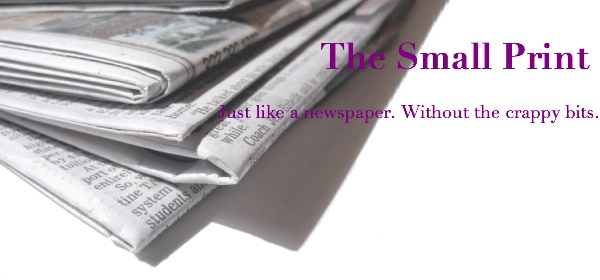Okay, so a bunch of designers have come up with a couple of goods in support for Barak Obama and a portion of the proceeds goes towards his campaign (it’s on the website, but I've never had a good head for numbers). And so maybe they’re not the chicest*. Maybe you’ve already got five billion and one similar things at home already. Maybe they’re not even relevant in Australia. But really, when else would you be able to buy designer goods and justify it by saying “I’m not just spending money again, this money is going towards a political campaign OKAY?”
Click to enlarge. 
*although they do look better than the Kevin ’07 tees, no?
Images: barackobama.com
Friday, September 19, 2008
Obam-ate '08 (all politicians need a rhyming name)
Thursday, June 19, 2008
Barack's In... Now What?
Its official: Senator Barack Obama is the presumptive nominee for the Democratic Party to face the Republican senator John McCain in November. Campaign slogans are being brandished about, but with the economy the number one concern of American voters, what does it all mean? BONITA SILVA reports.
The brandishing about of optimistic concepts was central to Barack Obama's campaign against Hillary Clinton: “change we can believe in” and the power of “hope” were the sentiments on which his general rhetoric was based. But since securing the Democratic nomination for the upcoming presidential election, Obama has taken a different tact. Now embarking on his general election campaign, Obama has become more focussed, specific, and grounded in his direction.
On the 9th of June he delivered a speech on the economy in Raleigh, N.C. In this address to 900 invited guests, Obama sustained an attack on McCain's agenda, asserting that "we were promised a fiscal conservative. Instead, we got the most fiscally irresponsible administration in history. And now John McCain wants to give us another. Well, we've been there once, We're not going back."
This is the core accusation and argument from Obama. Voting for McCain will result in nothing but a continuation of Bush's policies, from Iraq to the economy.
According to a CNN poll released last week, the economy topped Iraq, healthcare, terrorism and immigration as the most significant issue on voter’s minds.
The Obama campaign has shown that it is well aware of the voter’s concerns. Opening his two-week tour of contested states, the focus on the ailing economy was evident. He spoke of the loss of jobs over five consecutive months; more than 320,000 since the beginning of 2008.
“The percentage of homes in foreclosure and late mortgage payments is the highest since the Great Depression. The price of oil has never been higher and set a record on Friday for the largest one-day spike in history,” he said during his address.
For him, the cause of the crisis of the American economy is clear: “We did not arrive at the doorstep of our current economic crisis by some accident of history. This was not an inevitable part of the business cycle that was beyond our power to avoid. It was the logical conclusion of a tired and misguided philosophy that has dominated Washington for far too long.”
He proposed his own strategies to combat the issue should he be elected. A $50 billion economic stimulus package (a special package of spending and tax measures to enhance economic activity), relief for homeowners who face foreclosure, tax cuts for middle-income families/retirees, and an expansion of unemployment benefits.
Speaking at the National Small Business Summit in Washington, McCain highlighted the different approaches to the economy by the two candidates.
"No matter which of us wins in November, there will be change in Washington. The question is, what kind of change? ... Will we enact the largest single tax increase since the Second World War, as my opponent proposes, or will we keep taxes low for families and employers? ... This election offers Americans a very distinct choice about what kind of change we will have."
Clearly, in terms of the economic policy spectrum, McCain and Obama are on polar ends. Where Obama asserts that government should level the playing field for the lower income families/workers, McCain is the ‘classic fiscal conservative’ who believes in lowering taxes by small government.
Accusations of continuing Bush’s policies are apparent in McCain’s support in making the Bush tax cuts of 2001 and 2003 permanent. He believes lower tax rates would boost the economy and increase savings.
Obama would keep the Bush tax cuts but has a slight variation which is aligned with his overall position on the economy. The tax cuts would no longer be in place for those Americans earning roughly $250,000 a year or more. Income taxes would also be abolished for seniors earning an annual income less than $50,000.
The Democratic candidate said, “My vision involves both a short-term plan to help working families who are struggling to keep up and a long-term agenda to make America competitive in a global economy.”
Though at this point, one thing is certain as the Republic candidate said, “We offer very different choices to the American people.”
Image: Tonx's Flickrstream
Saturday, May 24, 2008
To Leave, or Not to Leave.
The truth is, Hillary Clinton can never satisfy the public. If she left the race at any point in the past, she’d be brandished a quitter. Suffice to say the critics would brand it as ‘proof’ that she could never be the Democratic nominee. Stay? She’s selfish, stubborn, and ruining Barack Obama’s chances. But do they supersede her own? Bonita Silva asks.
More is at stake than just a Democratic nomination and potential to be the next President of the United States of America. It may be hard to believe and potentially on the melodramatic side; but pointedly true.
It’s inevitable to note that the campaign has been defined in part by race and gender. Supporters of both camps have been wielding the appropriate issue to their advantage claiming any criticisms are based upon an institutionalised discrimination. Hillary claims sexism is part of the pressure mounted on her to quit.
Granted, this is somewhat true. Politics is undoubtedly a big boy’s club – particularly when it concerns Presidents and/or Prime Ministers. John Edwards didn’t face calls to quit the Democratic race during his campaign despite severely low chances of winning the nomination. Critics could have easily dismissed his campaign as wasting key delegates. If Hillary were the opposing male candidate, most would agree that the same calls would not be waged with such enduring vigour.
Secondly, for the most part of Obama's and Clinton's contest, it wasn’t like John McCain and Mike Huckabee. It was a real contest: real in the sense that both candidates were equally poised at taking the nomination at several stages. Numerically, intellectually, charismatically and policy-wise, Obama and Hillary faced equal prospects and chances. On the road to the convention, either candidate had a legitimate chance at clinching the right amount of delegates (for what was a substantial and extensive period). Yet the calls to quit have plagued the latter half of her campaign.
Though mounting pressure can have its adverse effects. Undoubtedly the pressure has only hardened Hillary’s resolve and resilience. One thing is certain: she’s going nowhere.
Admittedly, she’s managed to overstay her welcome. Option one would be to quit altogether and retreat in humiliation. Option two involves a stronger conviction and belief in her reasons for being there. Either option poses problems at this stage. Although the latter has prevailed, it’s no longer in Hillary’s hands to change the outcome. Super-delegates have failed in their responsibility to make their choices known, to end the race, and subsequently end her current humiliation.
She has still managed to garner immense turnouts and gain support from key constituents and groups that Obama is failing to register with. Where she leads over such a key demographic (that of the white, middle class, middle aged voters), critics should be weary of dismantling her efforts and discrediting her style. She’s earned her right to be standing where she is.
There’s not a single doubt that ego protruded in the way of a successful campaign. With a ‘Clinton’ brand name, she acted in a manner that suggested she was entitled to and deserved the nomination because of her ‘experience’ and all would assume – her family name. An exit of any means is now rendered ungraceful: but it’s now the super-delegates responsibility to quell that humiliation and let their choices be known.
“This is one of the closest races for a party’s nomination in modern history,” she mused. It’s true, and let the rightful candidate earn each vote to clinch the nomination.
Photo: Daniella Zalcman's Flickrstream
Thursday, May 15, 2008
Leaders PART 2
In this next part, you will be coming face to face with Mugabe and his political opponent...Tsvangirai. Hu, Obama and H.Clinton will have to wait for the next edition.
 So say hello to Robert Mugabe. Mugabe has been the President of Zimbabwe for 25 years, and is known for his anti-imperialist stance. He became President in 1987, and was re-elected in 1990, 1996 and 2002. His political career, and especially his time as President have been very controversial.
So say hello to Robert Mugabe. Mugabe has been the President of Zimbabwe for 25 years, and is known for his anti-imperialist stance. He became President in 1987, and was re-elected in 1990, 1996 and 2002. His political career, and especially his time as President have been very controversial.For example, in the recent 2008 presidential elections, he has again been accused of vote-rigging. In the past, he has also been accused of intimidation, and preventing certain groups from casting their votes.
The 2008 elections have shown, however, that the people want a new president. Mugabe lost to his opponent, Morgan Tsvangirai, but insisted that there be a presidential run-off to determine the winner.
 And this leads nicely, to Morgan Tsvangirai, Mugabe's opponent in the presidential election. Tsvangirai has agreed to have a presidential run-off, and he will be starting his run-off campaign when he arrives back in Zimbabwe.
And this leads nicely, to Morgan Tsvangirai, Mugabe's opponent in the presidential election. Tsvangirai has agreed to have a presidential run-off, and he will be starting his run-off campaign when he arrives back in Zimbabwe.Tsvangirai is currently the President of the Movement for Democratic Change (MDC). He is a known politcal and human rights activist, and founded the MDC in 1999 in response to President Mugabe. He lost the 2002 Presidential election against him and has been arrested and tortured on several occasions by the Zimbabwean government.
In the coming run-off campaign and election, Tsvangirai has stated that there will be free access for the media, including the international press. Hooray for the media (and, I suspect, also for Mr. Tsvangirai)!
Pictures: Reuters, Reuters Africa









